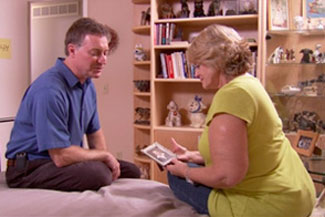What to Do
Observe their Activity
- Write down what the person was doing or what was happening just before their wandering activity started, increased, or decreased.
- Write down what you tried doing to stop the activity and what worked; what did not work?
- Note closely when the person has had a change in their life, such as a hospital stay or moving to a new home, as this often causes wandering.

For those people who are confused and unable to tell you when they are feeling sick, changes in their wandering pattern may be the first sign that something is wrong.
Keep a list of all of the person’s medicines. Write down the date when new medicines are started and any change in behavior that happens in the days and first weeks after that.
Try to Remove the Cause
Because wandering can be caused or triggered by many things, there are a variety of ways you can try to reduce it:
- Offer drink and food.
- Ask if the person feels too warm or cold. Adjust the room temperature or change their clothing as needed.
- Show the person to the bathroom.
- Ask the person to help you with a simple task, such as:
- Placing napkins on the table
- Folding laundry
- Helping to open the mail
- Get the person involved in something they like or did in the past, such as reading the sports results, playing familiar music.
- Stop extra noise in the house or take the person to an area in the house that is less noisy.
- Keep things in the home that makes it look familiar, like a favorite chair, pictures of loved ones, and pets.
- Put the person’s name on their bedroom door.
- Stick to the same routine with meal times, bathing, taking a walk, or bedtime.
- Have clocks and calendars out in the house. Slip cues about the time when you are talking together, such as “The mail will be here soon – it’s almost 3 o’clock in the afternoon already.” “I am expecting Sue to be here in another hour, around 2 o’clock”.
- Reassure the person that someone else is taking care of their work, such as. “Your boss is not expecting you today.” “Jane knows where you are. Someone else is taking care of her today.” You will likely have to repeat explanations.
- Do simple exercises together.
- Take the person for a drive or walk in the house, yard, neighborhood or shopping center. Do not leave them in a car alone. If he or she begins to wander away from you, walk a little way along with them and then gently guide them back in the right direction. Never force the person.
- Make sure your car keys are not available for the person to pick up. He or she could leave at night when no one would be watching.


See more safety tips included later in this lesson.
Take Care of Physical Health Needs
Comfort. Ask if the person is having pain and look for any signs that he may be in pain. See our Lesson on Recognizing Pain.
For example, if he or she lets you, check their mouth for sores and look at the throat for any redness. Does he or she stop chewing or grimace when eating? Are any of the joints swollen or does the skin have any sores or bruising? Is the person rubbing his head or any other body parts? Is he having any trouble urinating or having a bowel movement?
Time for Rest. Make sure there are rest periods but not long naps during the day. Sleeping too much during the day can make day/night confusion and night wandering worse. Being overtired, on the other hand, can agitate a person and increase their restlessness.
Diet. Weigh the person weekly, and write this down in your care diary. Give the person foods higher in calories and protein if they’re losing weight. Reading food labels and talking with your doctor or a dietician can help you make good food choices. If the person wanders away from meals, try finger foods that he or she can eat while walking.
Medicines. Assist your loved one with their medicines to be sure he or she is taking them correctly and at the right time. Keep medicines out of reach and out of sight to stop them from taking more medicine than is prescribed. Monitor their medicine planner closely.
See our Lesson on Giving Medicines Safely.